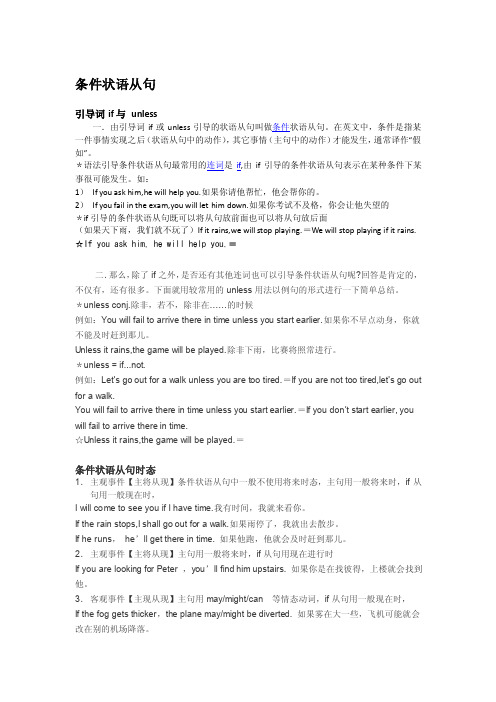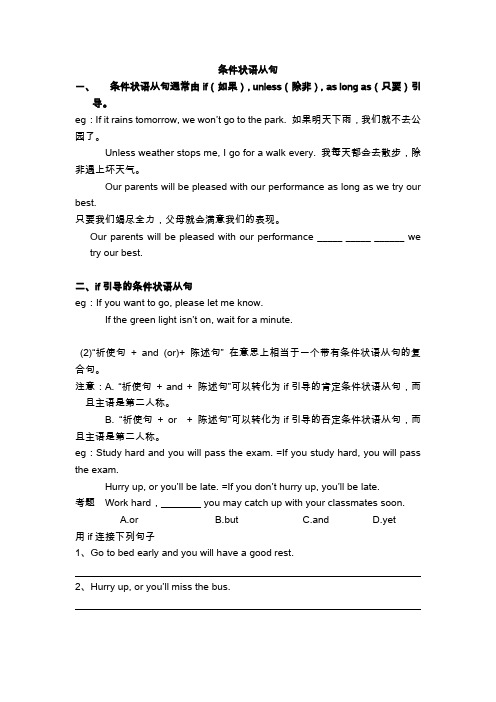条件状语从句(unless)
条件状语从句(余unless)

unless在意义上可以理解为if......not,在有些情况下两 者可以互换使用。
• eg: (1)除非我戴眼镜,否则我什么也看不到。 • I can't see unless I wear glasses. • = I can't see if I don't wear glasses.
I can sum up:
(1) if 从句用 ___________, 一般现在时 用来描述将来的情况。 主句用 __________, 一般将来时
(主将从现)
(2)如果主句是祈使句,那么从句通常用一般现在时
(主祈从现)
(3) 如果主句含有情态动词,从句用一般现在时
(主现从现)
如果在某种条件下,某事必然会发生,则应用 __________ 主现从现
• Eg: • (1) 如果你冷却蒸汽,它就会变成水。 •
• •
(2) 如果我们不浇花,它就会枯死。
If you cool steam, it turns into water.
If we don't water a flower,it dies.
(3) 如果你把花瓶摔了,它就会碎。
If you drop a vase, it breaks.
Unless的用法:
• unless "除非" 用来引导否定意义的条件句
unless 引导条件句时,主要用于下列情况: (1)主句为肯定句 eg:除非你快点,否则就会错过这班车。
You will miss the bus unless you are hurry up. eg:除非你提高你的书写,否则你将会在考试中丢分。 Unless you improve your handwritting,you will lose marks in the exam.
条件状语从句ifunless

条件状语从句引导词if与unless一.由引导词if或unless引导的状语从句叫做条件状语从句。
在英文中,条件是指某一件事情实现之后(状语从句中的动作),其它事情(主句中的动作)才能发生,通常译作“假如”。
*语法引导条件状语从句最常用的连词是if,由if引导的条件状语从句表示在某种条件下某事很可能发生。
如:1)If you ask him,he will help you.如果你请他帮忙,他会帮你的。
2)If you fail in the exam,you will let him down.如果你考试不及格,你会让他失望的*if引导的条件状语从句既可以将从句放前面也可以将从句放后面(如果天下雨,我们就不玩了)If it rains,we will stop playing.=We will stop playing if it rains.☆If you ask him, he will help you.=二.那么,除了if之外,是否还有其他连词也可以引导条件状语从句呢?回答是肯定的,不仅有,还有很多。
下面就用较常用的unless用法以例句的形式进行一下简单总结。
*unless conj.除非,若不,除非在……的时候例如:You will fail to arrive there in time unless you start earlier.如果你不早点动身,你就不能及时赶到那儿。
Unless it rains,the game will be played.除非下雨,比赛将照常进行。
*unless = if...not.例如:Let's go out for a walk unless you are too tired.=If you are not too tired,let's go out for a walk.You will fail to arrive there in time unless you start earlier.=If you don’t start earlier, you will fail to arrive there in time.☆Unless it rains,the game will be played.=条件状语从句时态1.主观事件【主将从现】条件状语从句中一般不使用将来时态,主句用一般将来时,if从句用一般现在时,I will come to see you if I have time.我有时间,我就来看你。
If和unless引导的条件状语从句的用法

if引导的条件状语从句由引导词if或unless引导的状语从句叫做条件状语从句。
条件状语从句用来说明主句动作发生的条件,即某一件事情(从句中的动作)实现之后,其他事情(主句中的动作)方能发生。
其中if是“如果,假如”的意思。
if引导的条件状语从句使用须知:一、位置if引导的条件状语从句,既可放在主句之前也可放在主句之后。
当从句置于主句之前时,常用逗号与主句隔开。
例如:You will catch the bus if you get up early.=If you get up early, you will catch the bus.如果你早起的话,就能赶上公共汽车。
二、时态(1)若主句是一般将来时,if引导的从句用一般现在时If it rains tomorrow, I’ll stay at home. 如果明天下雨,我将呆在家里(2)如果主句是祈使句或含情态动词can, may, must等时,从句也用一般现在时。
例如:You must see the doctor if you are ill. 如果你生病了,你必须去看医生。
If you want to go skating, wear warm clothes. 如果你想去滑冰,穿上暖和的衣服。
三、主句不能用be going to 表示将来,只能用will.四、宾语从句中的if与条件状语从句if的区别。
宾语从句中的if“是否”相当于 wh ether,引导宾语从句,时态需根据语境确定。
如果主句用一般现在时,从句可以根据具体情况选用时态,如果主句用一般过去时,从句必须用过去式的某种形式。
I don’t know if it will rain tomorrow.我不知道明天是否会下雨。
The old woman asked me if I knew the way to the hospital.老妇人问我是否知道去医院的路。
unless引导的条件状语从句使用须知:unless也可引导条件状语从句,意思是“如果不;除非”,相当于if…not…We’ll go for a picnic if it doesn’t rain this Sunday=We’ll go for a picnic unless it rains this Sunday.精品文档。
8B 1 条件状语从句(unless) 2

●if条件状语从句一:如果谈论的是某一个条件发生后
势必或一定 _________会产生某个结果,那么主从句都用一般现在时态,即 表示某种客观真理或普遍现象时,主现从现。 e.g. If you cool water, it turns into ice. If you heat ice, it melts. If you stick a pin into a balloon, it bursts.
条件状语从句:
if "如果", unless "除非"
Read the following sentences and summarize them. 读下列句子并总结 1. If something dramatic happens, we usually remember it well. 2. If you want to remember something, you should make of it in your mind. 3. If someone shouts “Spider” and puts a big spider on your hand, you will probably remember the word “spider”. 4. If the picture is silly, strange and colorful, you will remember it better.
Problems
go to bed late
be … in the morning
home My mother says that if I ______, I will_______.
Problems
don’t clean my room
条件状语从句

条件状语从句一、条件状语从句通常由if(如果), unless(除非),as long as(只要)引导。
eg:If it rains tomorrow, we won’t go to the park. 如果明天下雨,我们就不去公园了。
Unless weather stops me, I go for a walk every. 我每天都会去散步,除非遇上坏天气。
Our parents will be pleased with our performance as long as we try our best.只要我们竭尽全力,父母就会满意我们的表现。
Our parents will be pleased with our performance _____ _____ ______ we try our best.二、if引导的条件状语从句eg:If you want to go, please let me know.If the green light isn’t on, wait for a minute.(2)“祈使句+ and (or)+ 陈述句” 在意思上相当于一个带有条件状语从句的复合句。
注意:A. “祈使句+ and + 陈述句”可以转化为if引导的肯定条件状语从句,而且主语是第二人称。
B. “祈使句+ or + 陈述句”可以转化为if引导的否定条件状语从句,而且主语是第二人称。
eg:Study hard and you will pass the exam. =If you study hard, you will pass the exam.Hurry up, or you’ll be late. =If you don’t hurry up, you’ll be late.考题Work hard,________ you may catch up with your classmates soon.A.orB.butC.andD.yet用if连接下列句子1、Go to bed early and you will have a good rest.2、Hurry up, or you’ll miss the bus.三、if从句与主句具有以下特点:1.If从句中用一般现在时,表示未来的一种条件,从句中可以加时间状语。
英语条件状语从句的用法总结

条件状语从句的用法总结条件状语从句就是在复合句中表示主句动作发生条件的状语从句。
引导条件状语从句最经常用的连词是if,它的意思是“如果”;除此之外,还有unless (=if…not如果不……,除非), as/so long as(只要), while(=as long as只要), supposing (that)/provided /providing (that)(假如), in case(假使), on condition that(在……的条件下)等。
它们也多少含有“如果”的意思,也可用于引导条件状语从句。
1. 用if引导:if意为“如果”。
如:You can’t take photographs if the light is bad. 光线不足,就无法拍照。
If you cheat in the exam you’ll never get away with it. 考试作弊必予追究。
2. 用unless引导:unless的意思是“如果不”“除非”。
如:Don’t act unless you’re certain. 没有把握就不要做。
Unless you go at once you will be late. 如果你不马上走,就会迟到的。
3. 用as [so] long as引导:as [so] long as的意思是“如果”“只要”。
如:I’ll remember that day as long as I live. 只要我活着,我就不会忘记那个日子。
You may take my dictionary as long as you don’t keep it too long. 只要使用时间不太长,你可以把我的词典拿去。
4. 用in case引导:in case用连词引导条件状语从句时,其意为“如果”“万一”。
如:In case I’m late, start without me. 万一我迟到,就不等我了。
unless的用法和例句

unless的用法和例句一、了解unless的用法当我们学习英语时,必然会遇到许多词汇和语法结构。
其中一个常见的语法结构是“unless”。
在本文中,我们将重点介绍unless的用法和例句,并探讨其在不同上下文中的含义。
1. 除非引导条件状语从句Unless通常用于引导条件状语从句,表示某种情况只有在后面所描述条件不满足时才会发生。
这与if引导的条件状语从句相反,if表示条件成立时才会发生某事。
因此,unless可以被理解为“如果不”的意思。
例如:- I won't go to the party unless you come with me.(除非你和我一起去,否则我不会去参加派对。
)- We won't be able to finish the project on time unless we work together.(除非我们共同合作,否则我们无法按时完成项目。
)2. 含义类似于if not在某些情况下,unless可以替代if not来表达否定的条件。
这种用法更常见于口语交流和日常对话中。
例如:- I'll be late unless the traffic isn't bad.(如果交通畅通,我不会迟到。
)- Unless you apologize, I won't forgive you.(如果你不道歉,我就不会原谅你。
)3. unless的倒装结构当unless引导的条件状语从句中包含动词be时,可以使用倒装结构来强调。
在这种情况下,主语和谓语顺序颠倒。
这种用法通常用于正式场合。
例如:- Unless it is done, the project will not be approved.(除非完成它,项目将不会获得批准。
)- Unless one works hard, success cannot be achieved.(如果不努力工作,就无法取得成功。
条件状语从句

条件状语从句引导条件状语从句的连接词主要有:if(如果)、unless(除非)或as long as(只要)等。
unless在意思上等于if...not。
一、条件状语从句用法1、引导条件状语从句最常用的连词是if,由if引导的条件状语从句表示在某种条件下某事很可能发生。
如:If you ask him, he will help you.如果你请他帮忙,他会帮你的。
If you fail in the exam, you will let him down.如果你考试不及格,你会让他失望的。
另外,if从句还表示不可实现的条件或根本不可能存在的条件,也就是一种虚拟的条件或假设,从句多用一般过去时或过去完成时。
如: If I were you, I would invite him to the party.如果我是你,我会邀请他参加聚会。
2、unless = if...not.除非,若不,除非在……的时候例如:Let's go out for a walk unless you are too tired.=If you are not too tired, let's go out for a walk.Unless it rains, the game will be played.除非下雨,比赛将照常进行。
3、so/as long as只要例句;You may borrow my book as long as you keep it clean. 只要你保持书的清洁,你就可以把我的书借去。
So long as you’re happy, it doesn’t matter what you do. 只要你高兴,你做什么都没有关系。
二、时态问题在条件状语从句中,要注意“主将从现”的规定,即主句用一般将来时,从句用一般现在时表示将来时。
例:If it doesn’t rain tomorrow, we will go hiking.如果明天不下雨,我们就去远足。
- 1、下载文档前请自行甄别文档内容的完整性,平台不提供额外的编辑、内容补充、找答案等附加服务。
- 2、"仅部分预览"的文档,不可在线预览部分如存在完整性等问题,可反馈申请退款(可完整预览的文档不适用该条件!)。
- 3、如文档侵犯您的权益,请联系客服反馈,我们会尽快为您处理(人工客服工作时间:9:00-18:30)。
条件状语从句: 条件状语从句:If
①
1. 如果他努力学习,他将会通过考试。 如果他努力学习,他将会通过考试。 studies hard, will pass If he _______ hard, he ________ the exam. exam.
一般现在时 2. if 从句用___________,主句用 从句用___________, __________,用来描述将来的情况。 __________,用来描述将来的情况。 一般将来时
Unless = If…not
3. 除非天下雨,他通常是走路去上学。 除非天下雨,他通常是走路去上学。 goes to school He usually _____________ on foot if it doesn’t rain ___________. Unless it rains goes to school =_____________, he usually _____________ on foot. 4. 如果你现在不走,你就赶不上火车了。 如果你现在不走,你就赶不上火车了。 don’t leave now won’t catch If you ________________, you _________ the train. Unless you leave now = ___________________, you won’t catchthe _________ train.
3. 口诀: ___________ 口诀: 主将从现
条件状语从句: 条件状语从句:If ②
1. 如果我把玻璃杯扔掉,它就会摔碎。 如果我把玻璃杯扔掉,它就会摔碎。 drop breaks If I _______ a glass, it ________. glass, ________.
一般现在时 2. if 从句用___________,主句也用 从句用___________, __________,表示客观事实或习惯。 __________,表示客观事实或习惯。 一般现在时
3. 口诀: ___________ 口诀: 主现从现
Unless 如果不,除非 如果不,
条件状语从句: 条件状语从句: unless 从句遵循if 从句 从句遵循if 主将从现 和 主现从现 的情况。 的情况。
要领: 要领:unless = if …not
Part C: Page 9
C2: Match the half-sentences in Column A with the correct ones in Column B.
Summary
if从句 if从句 条件状语从句: 条件状语从句: unless从句 unless从句 将来 客观事实 习惯
主将从现 时态口诀: 时态口诀: 主现从现
Unless = If…not
1. 如果明天不下雨,我们就去远足。 如果明天不下雨,我们就去远足。 If it doesn’t rain tomorrow we will go hiking. __________________, unless it rains tomorrow. =We will go hiking __________________ 2. 如果你不把肉存放在冰箱里,它就会变坏。 如果你不把肉存放在冰箱里,它就会变坏。 don’t keep the meat If you__________________ in the fridge, it goes bad _________. Unless you keep the meat = _______________________in the fridge, it goes bad _________.
